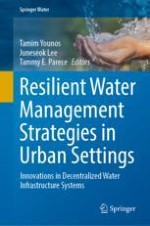2022 | OriginalPaper | Buchkapitel
Water Sector Reconstruction for Post-disaster Housing Settlements: A Tale of Two Governance Models
verfasst von : Luke Juran, Robert D. Oliver, Dustin C. Read
Erschienen in: Resilient Water Management Strategies in Urban Settings
Aktivieren Sie unsere intelligente Suche, um passende Fachinhalte oder Patente zu finden.
Wählen Sie Textabschnitte aus um mit Künstlicher Intelligenz passenden Patente zu finden. powered by
Markieren Sie Textabschnitte, um KI-gestützt weitere passende Inhalte zu finden. powered by
